Somewhere in between the panel where I got to listen to a video game writer talk about romance writing and the small, oppressively hot room where I asked about how furries play tabletop games in their fursuits, it hit me: I should be able to meet these people and have these experiences at any gaming convention. But the sad truth is, I can’t. The gaming industry doesn’t usually listen to the voices of the people on the fringes, the ones who actually need to be heard.
You see, in the current landscape of games and gaming conventions, you find that going to one as an attendee leaves you lost in a sea of what could be described as the physical manifestation of the internet. You soon realize the jerks your mother warned you about in your younger days are actually people. They exist. On top of that, they are exactly the same as they are online. Now, that’s not to say everyone on the internet is a jerk. It’s just that most of the time you’ll see a higher concentration of trolls and bullies in the gaming circles, and more often than not, they become the vocal majority, edging out any other voice that does not agree with them.
I remember hearing about GaymerX (then Gaymer Con) via reddit.com, on the /r/gaymers subreddit. Back then, the website for the convention was still in its infancy, and they were searching for volunteers and people to test out the website. I gave it a quick once-over, and for the most part, it seemed well put together, but it needed a lot of work. I specifically remember grappling with a bit of concern, idly musing to myself whether this was some form of foreshadowing. I bit my tongue, helped out where I could, and promptly forgot about it.
Here’s the thing: way back then, I didn’t think GaymerX was going to work. I’d like to state upfront that I was hoping they would prove me wrong (and they did; more on that later). I don’t know if it was apprehensiveness towards events that are billed as LGBTQcentric, or if it was my growing cynicism towards the gaming industry and the gaming community at large. Many people, including myself, shared a fear that it would end up pandering to the community as opposed to enriching it.
More than that, I feared that GaymerX was aiming to do the impossible. It was trying to change the face of a decades old industry. The crew behind GaymerX held on to their fervent dedication to proving themselves, hoping to justify their existence to a culture fraught with ignorance and misunderstanding. In that way, GaymerX shares a common struggle with quite a few video game protagonists. They find themselves in a situation where the odds are absolutely against them, failure nipping at their heels like starving hounds. One misstep, one failure, even one mediocre performance, and not only would they go tumbling into oblivion, they felt they would also set back the queer community as a whole on the gaming front.
Hyperbole aside, I guess one can liken this kind of struggle to coming out and finding your voice as an LGBTQ person. You slowly start to find reasons to stick up for yourself. You find spaces where you feel safe to be who you are, or you go out on your own and create one. It’s not exactly fighting off an army of demons, but sometimes it feels like it.
Just like how sometimes we feel we have to justify our existences, GaymerX had to do the same. Matt Conn, one of the convention’s cofounders said, “This can’t fail, or even be mediocre because it is going to set back the fight even more.” Fellow cofounder Kayce Brown agreed. She said, “We had no big money sponsors, we really had to prove ourselves.” The entire gaming world was watching to see what would happen, and surprisingly enough, the impact was felt nearly the world over. They had to show gamers why something like this needed to exist. More than that, they had to show the world why something like this needed to exist.
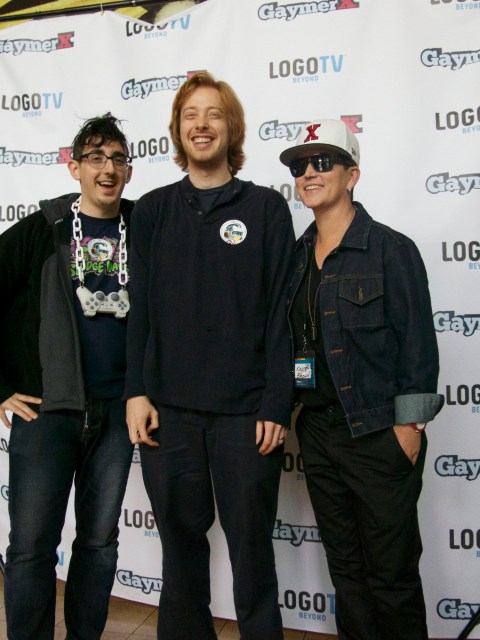
Matt Conn, Zach Weiner (of Saturday Morning Breakfast Cereal), Kayce Brown
As hard as it is to be any kind of queer online, and as hard as it is to come out on social media into the faceless ether that is the internet, it’s just as hard to eke out a safe space to just… exist at a gaming convention. It can make someone downright uncomfortable, if not completely ostracized. This discomfort, this strange, yet all too familiar desire to hide yourself is exactly what GaymerX set out to eliminate. It was evident in their slogan from day one: “Everybody games.” Beyond providing a safe space for people to be who they are, they wanted to let people geek out on whatever the hell they wanted to geek out on.
It was this perfect intersection of queerness and nerdery that attracted me to the convention.
When I arrived, I have to admit I was a little concerned. I wondered to myself why we, as queer folk, have to have our own convention. Why did we have to isolate ourselves? I approached the hotel doors with a bit of skepticism, but a healthy dose of hope. I was trying hard to not let my jaded attitude towards other gaming conventions color my view of this one, as I had really hoped that there was something special here, something that would really change my mind both as a queer writer and a gamer.
Waiting in line for my badge, I wondered what would set this convention apart from the already stiff competition. Blizzcon has the benefit of being all about Blizzard games and their rabid fanbase. PAX is very much the closest thing to a general gaming convention, and most of the remaining conventions aren’t even open to the public. It’s difficult to be heard by huge game studios when you’re straight, white, cis, and male. Just imagine how impossible it is for queer people to have their concerns and issues heard, even if they’re not queer-related issues.
Some of the panels addressed just that. They demonstrated how to build a community and make sure that we’re being listened to. The interesting thing about a lot of these panels is that they would be right at home at any queer summit. These kinds of talks and the topics being covered are things that can help any community, even outside of gaming. More than that, they were seeking opinions from the fans, actual queer fans who want nothing more than to be able to be themselves in a free and open space both online and offline.
It’s really something you never see at larger conventions. At most conventions, Big Game Company X gives their presentation, and takes generic questions from a few selected fans in a giant hall full of people who are watching. It’s incredibly intimidating. But when you make the space smaller, and when you emphasize the safe space clause over the entire convention itself, it not only emboldens the fans and the people, but it also allows the developers and community managers a real chance to listen without being pressured to write things off by the environment surrounding them. It gives them a chance to really ask, with all seriousness, what we as queer gamers want out of our experience. Silence is something that plagues every marginalized demographic. Luckily, and quite surprisingly, silence was sparse at every Q&A session.
This was exhibited the best in the twitch.tv panel about building LGBTQ communities online, led by twitch.tv’s community manager, Jared Rea. The Q&A following the presentation sparked a really interesting discussion about the reclamation of certain words, and the attempts by the community to convert them from symbols of hate to symbols of empowerment. For example, queer is a term that used to be derogatory, a word that was uttered when you wanted to hurt someone. Now, it is something that many of us now identify as and use freely. It is, arguably, one of the best examples of reclaimed hate speech, but I digress.
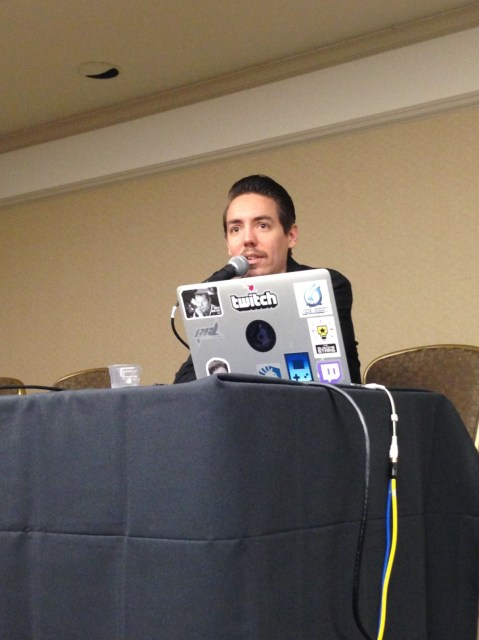
Jared Rea discusses the reclamation of hate speech.
The discussion afterwards focused on how twitch.tv was looking to globally ban words like ‘queer,’ as they can (and are) still used as insults today. There was a great back and forth about how reclaiming these words and subverting the hateful message behind them was a good thing. Many people wondered what this meant for their policy, and how twitch.tv would propose to judge intent. It was a discussion that was full of strong opinions, and to his credit, Jared offered to discuss things further with them. He actually engaged with them, and made everyone feel like they were listened to, a real rarity in this day and age.
Still, there were points throughout the day in certain panels where I felt that the message was being diluted. Other panels went in depth as to how video games were seeking to empower the end user, and how they, as developers, are trying give us the freedom to protect ourselves while they are, at the same time, trying to build a better community so we don’t have to. A lot of it seemed very boilerplate, and things that would seem obvious to any company trying to emphasize how diverse they are.
But, there were just as many standout moments where I learned exactly what a convention like GaymerX can accomplish.
Take for example Porpentine’s panel, titled Radical Play. It began with her discussing how games are a great avenue for queer people to get their stories out into the world. As part of the panel, she showed an example of a game created in Twine, an interactive story simulator, lauded for its accessibility and ease of use. The story was a linear, but poetic readthrough of a young person’s walk home through a very seedy part of town. This was a fine example of how with a simple, straightforward tool like Twine, we can work to change the face of gaming. It illustrated her message about using simple tools and putting them into the hands of the people who need it the most. It also showed how, if done properly, it allows gamers and readers to really enter and experience another person’s world, something that can go a long way towards building understanding.
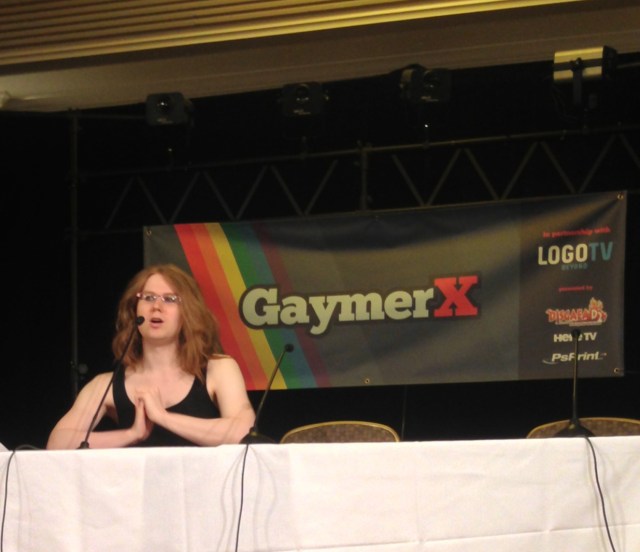
Porpentine inspires attendees to make their voices heard.
These discussions and panels would most likely never, ever happen in another convention. It can be intimidating standing up in a giant convention hall surrounded by what could possibly be some hurtful people, and out yourself with a question concerning LGBTQ issues. It’s enough to make you want to just sit down and stay silent. It’s enough to make you want to crave… a safe space.
That is what GaymerX was able to bring to the table.
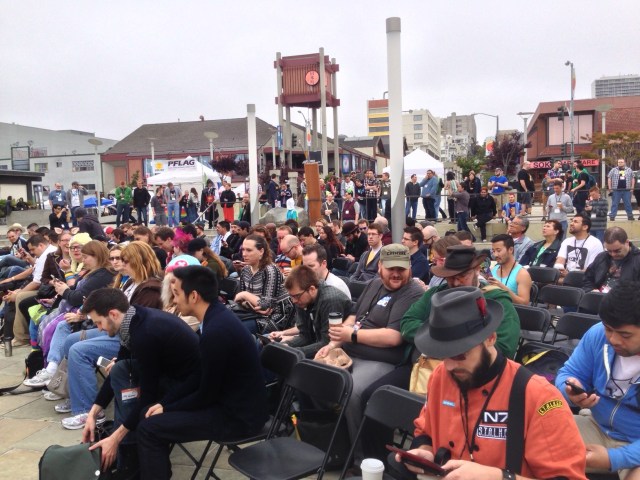
An eager crowd awaits the opening ceremonies.
Here, surrounded by what had to be some of the most genuine people I’ve ever met a convention, I began to understand why a place like this was so important. Just looking around, I was faced with people who were, to put it bluntly, comfortable. I saw people who were walking around, unafraid and unworried about how they were acting, or who was around them. I, like them, understand that in the gaming world, to be different is to be wrong. To be true to yourself and let down your guard is something that reflects weakness, and something not to be appreciated or celebrated.
In the gaming world, it is hard to be who you are. GaymerX changes all of that and makes it okay to be anything you want.
Matt and Kayce’s absolute dedication to both protecting the community and gaming itself was evident in the way they spoke and how they expressed their motivations concerning GaymerX. Kayce, who has never been a victim of bullying herself, is hellbent on making sure that the youth who are growing up today have the opportunity to experience the kind of upbringing she’s had. Growing up, she never experienced pushback from her family, and was shown
support when she was coming out. Her story is atypical, and she knows it. She just hopes that one day it won’t be so rare.
That was why she was so interested in working with Matt. Beyond his clear and utter devotion to the cause and the convention, she saw and understood ever so clearly what he was trying to do. Matt said was trying to create something special, he was “doing this for himself 10 years ago… nobody was fighting for this, but people are slowly realizing that this is something that’s wanted.” Struggling to have queer voices heard in any medium is difficult, but in gaming it was simply unheard of. And now, with GaymerX, there is that group, there is that venue for people to speak out and be accepted as well as heard.
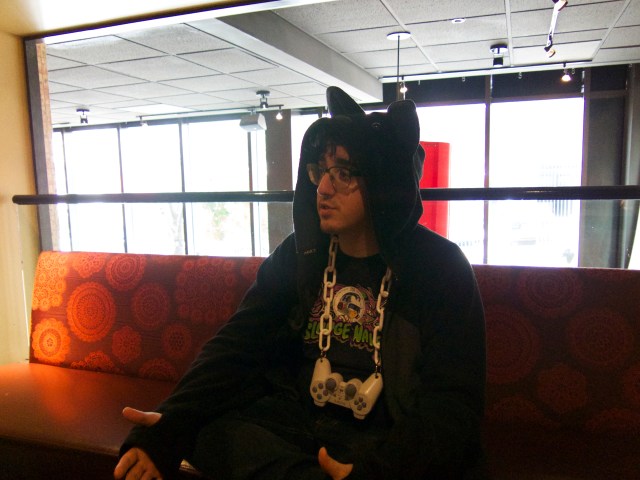
Matt voices his hopes about the future of GaymerX.
Perhaps the most interesting thing about their beliefs towards GaymerX lies in their mutual feelings towards its future. Both Matt and Kayce agree that hopefully one day, the world won’t need GaymerX. One day, these kinds of discussions and this kind of safe space will exist anywhere and everywhere it needs to be. Matt would love to one day be able to say that it’s all over, and he’d feel okay with the fact that GaymerX would no longer be needed. He would be okay with the fact that it’d be obsolete, because it would already be happening in the wild, so to speak.
It was all so clear at that moment. It was never their intention for GaymerX to become a permanent place to isolate and confine the queer gaming community. It was supposed to serve as an example, something that will show just how possible something like this can be in any given space. I guess GaymerX’s true victory will be one that is bittersweet, in that it will maybe one day do its job so well that it doesn’t need to exist anymore.
Like any good hero, GaymerX will hopefully one day be able to hang up its sword and shield, take a load off, and really have the time and energy to enjoy the better world it helped shape. With any luck, the world won’t need warriors or defenders like Matt and Kayce. With any luck, we won’t feel we need to create separate safe spaces anymore… because everywhere will be safe. We won’t need people to protect us anymore, because we’ll be protecting ourselves.
Until that day, I will let my gaymer banner fly proudly, rally with my fellow followers, and share the message with the world. I want to stand alongside GaymerX and fight for every inch of safe space in an ever more hostile gaming world.
I can’t wait until next year.
Jessica Lachenal thinks that GaymerX is the convention that the gaming world deserves, but not the one it needs right now. So they’ll hate on it, because it can take it. Because it’s not a convention. It’s a radical change. An open dialogue. A safe space.

+1
Great article
Thanks for the report! I really wanted to go (lots of comic artists I like were there, on top of everything else), but time, money, thesis, etc. NEXT YEAR
This sounds pretty great.
I’ve been a gamer all my life, and I find the gaming community generally seems to live in a den of willful sexist, hypermasculine and homophobic ignorance. Which astounds me considering that growing up, gamers were really upset that people marginalised and misunderstood them, bullied and persecuted them… and now it’s 2013 and they’re more of an “exclusive boys’ club” than I’m sure the sweatiest Australian football game could be.
I hate being called a “girl gamer”. I hate that a common phrase is that they’re going to “rape” you in Call of Duty or Halo multiplayer. Or that everybody is a “faggot”.
I actually stopped talking about games with anyone because it was so hard to have a discussion without hearing hurtful slurs being thrown around.
So glad you guys did a report on this! I worked at Blockbuster for 4 years, and it is 100% true that everybody games. I’m a gamer and also a pretty demanding consumer.. For instance refusing to shop somewhere if the app doesn’t have good formatting on my tablet. The gaming industry could be getting so much more money from me if the weren’t coding so many things as Not For Girls/Gays/PoC. I think the studios are starting to recognize this and I’m so grateful to the gaymers who are forcing them to pay attention!
This was a great article! I, too, hope that these conversations will one day be a part of every convention.
I’m disappointed I missed out on GaymerX. I’m really hoping to go next year. I’m in the industry and I’m excited to see how its slowly becoming more inclusive, even though there’s so much more to go.
Porpentine – the little sister of my 1st and most important rolemodel, SHODAN. Truly wish i could have been there.
Yes, Absolutely all of this. I grew up in a house of gamers and it’s always struck me how gaming has done wonders for my brothers social lives and I find myself gaming solo. Seeing a room full of gay gamers would be like finding all the Stones of Barenziah stacked neatly in a room (Skyrim anyone..?)
This is so awesome!
That’s absolutely brilliant.
I run a queer/feminist gaming blog (feministgaming.tumblr.com, if anyone wanted to know), and I face a fair amount of hostility from male gamers for ‘threatening’ gaming with my queer lady-ness (including from an ex-boyfriend, back when I used to date men). If conventions like this help change the straight-white-male atmosphere of gaming culture, then this can only be a good thing! I’d love to be able to go one day.